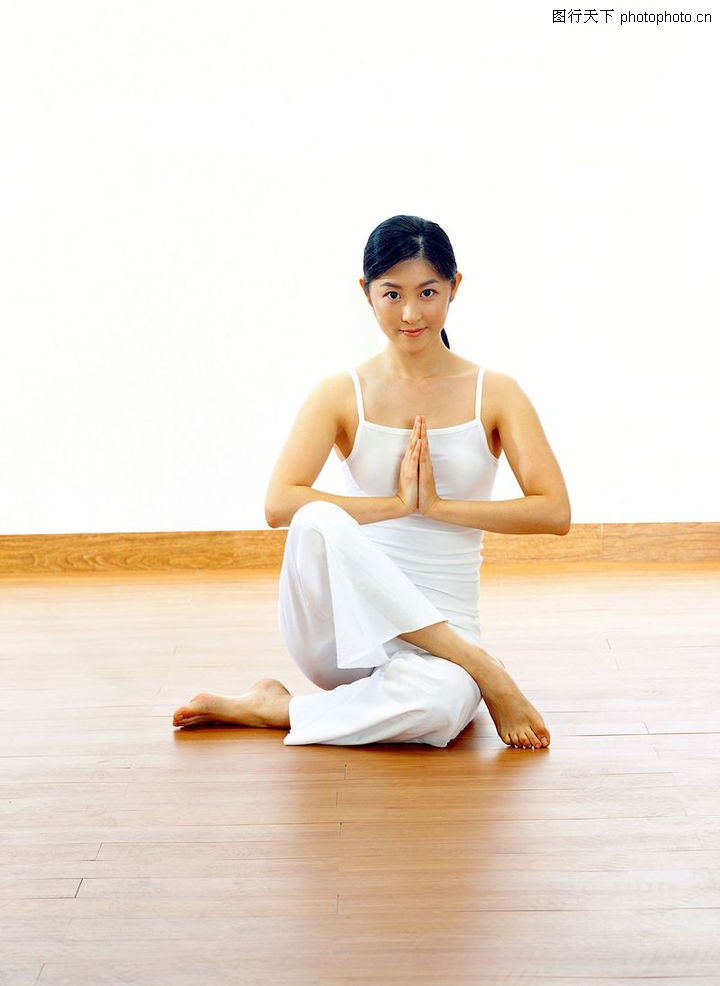
Feeling tired? Under too much stress? No time to exercise?
Well, you may want to try yoga. It's what more and more people have been turning to to ease the troubles of modern life. Practically unheard of in the West until 50 years ago, yoga has become one of the most popular health trends around.
Yoga has become so popular in recent years; it's easy to overlook the fact that it is actually one of humankind's oldest activities. Scholars think that yoga grew out of the methods used by shamans of the Indus Valley, more than 5,000 years ago.
Shamans were the holy men of early human civilization. Their role in society was to communicate with the spirit world to find solutions to problems facing their people. Over time, these shamans developed a system of mental and physical exercises to expand their consciousness, and thereby1 give a new perspective on the problems of daily life. These exercises formed the foundation of modern yoga.
For thousands of years yoga was practiced mainly in India. The exercises of yoga were incorporated into three of the Indian religions: Hinduism, Jainism and Buddhism2. Technically3, yoga is not a religion; it is a method that can be used by anyone to pursue their own religious (or non-religious) goals. Siddhartha, the founder4 of Buddhism, practiced yogic meditation5, and meditation is still a central part of Buddhism today.
Yoga was practically unknown to the West until the 1960s, when popular culture began to show an interest in Eastern religions. Pop culture icons6, such as the Beatles, helped popularize yoga by showing interest in yogic meditation. People began to look at yoga as a way to find peace of mind in a world that was anything but peaceful.
Since the 1960s yoga's popularity has grown steadily7. Nowadays, Westerners practice all kinds of yoga. There is Bikram, or "hot Yoga", done in rooms heated to over 40 degrees Centigrade. There is baby yoga in which infants copy the stretching poses of their mothers. There are even yoga classes for people in their 70s!
In fact, there are so many people who want to learn yoga that yoga schools across the United States are having difficulty keeping up with the demand. Judging by its popularity, yoga is as useful for solving the problems of today as it was for solving the problems 5,000 years ago.
累了吗?压力太大吗?没空运动?那么,你也许想试试瑜珈。已经有越来越多的人求助瑜珈来舒缓现代生活的烦恼。五十年前在西方几乎还没有人听说过瑜珈,可是现在它已经成为世界各地最流行的健康风潮之一。
近年来瑜珈如此受欢迎,很容易让人忽略一个事实:瑜珈其实是人类最古老的活动之一。学者认为瑜珈发源自五千多年前印度河谷里巫师所采用的做法。
巫师是早期人类文明中的圣者。他们在社会上的角色就是要跟神灵世界沟通,为人们面临的困难寻求解决之道。随着时间的更迭,这些巫师发展出一套心理与生理的运动系统来拓展他们的知觉,因而能从新的角度看待日常生活中的问题。这些运动成为现代瑜珈的基础。
几千年来,瑜珈主要在印度盛行。瑜珈运动被整合到印度三大宗教中:印度教、耆那教以及佛教。严格说来瑜珈并不是宗教;它是任何人都可以使用的方法,用来追求个人的宗教(或非宗教)目标。佛教创始者悉达多(释迦牟尼的本名),就做过瑜珈打坐,而打坐直到现在依然是佛教的重要部分。
西方世界对瑜珈几乎是一无所知,直到20世纪60年代才改变,当时的流行文化开始对东方宗教产生兴趣。流行文化偶像例如披头士对瑜珈打坐表现出兴趣,这有助于瑜珈的推广。人们开始将瑜珈看作一种在这个绝对不平静的世界里寻求内心平静的方式。
20世纪60年代以来,瑜伽受欢迎的程度一直在稳定增长。现在,西方人做各种各样的瑜珈。有彼克兰瑜珈,又称“热瑜珈”,要在加热到摄氏四十度以上的房间里做。也有婴儿瑜珈,小宝宝模仿母亲做伸展运动。甚至还有专为七十多岁银发族开设的瑜珈课程!
事实上,美国有太多人想学瑜珈,以至于整个美国各地的瑜珈学校供不应求。从瑜珈风行的程度来看,无论是拿来解决现代人的问题或是解决五千年以前的问题,瑜珈一样管用。
 收听单词发音
收听单词发音
1
thereby [ˌðeəˈbaɪ]
 第8级
第8级 |
|
| adv.因此,从而 | |
参考例句: |
|
|
|
2
Buddhism [ˈbʊdɪzəm]
 第8级
第8级 |
|
| n.佛教(教义) | |
参考例句: |
|
|
|
3
technically [ˈteknɪkli]
 第8级
第8级 |
|
| adv.专门地,技术上地 | |
参考例句: |
|
|
|
4
Founder [ˈfaʊndə(r)]
 第8级
第8级 |
|
| n.创始者,缔造者 | |
参考例句: |
|
|
|
5
meditation [ˌmedɪˈteɪʃn]
 第8级
第8级 |
|
| n.熟虑,(尤指宗教的)默想,沉思,(pl.)冥想录 | |
参考例句: |
|
|
|
6
icons [ˈaɪˌkɔnz]
 第8级
第8级 |
|
| n.偶像( icon的名词复数 );(计算机屏幕上表示命令、程序的)符号,图像 | |
参考例句: |
|
|
|